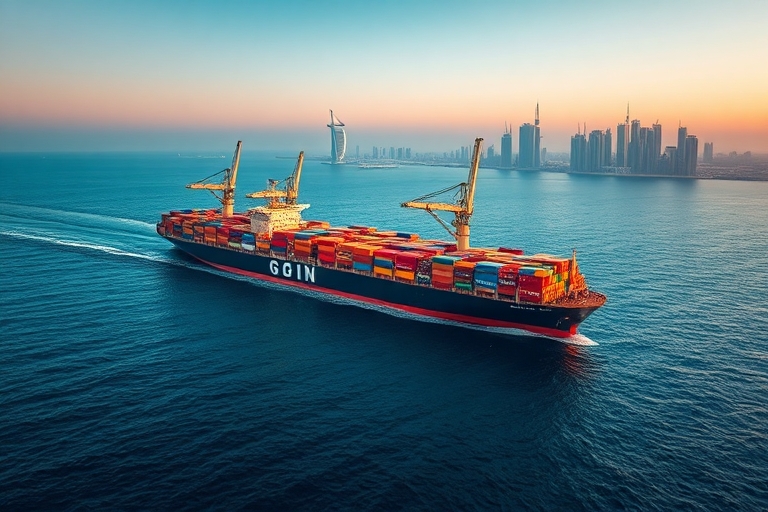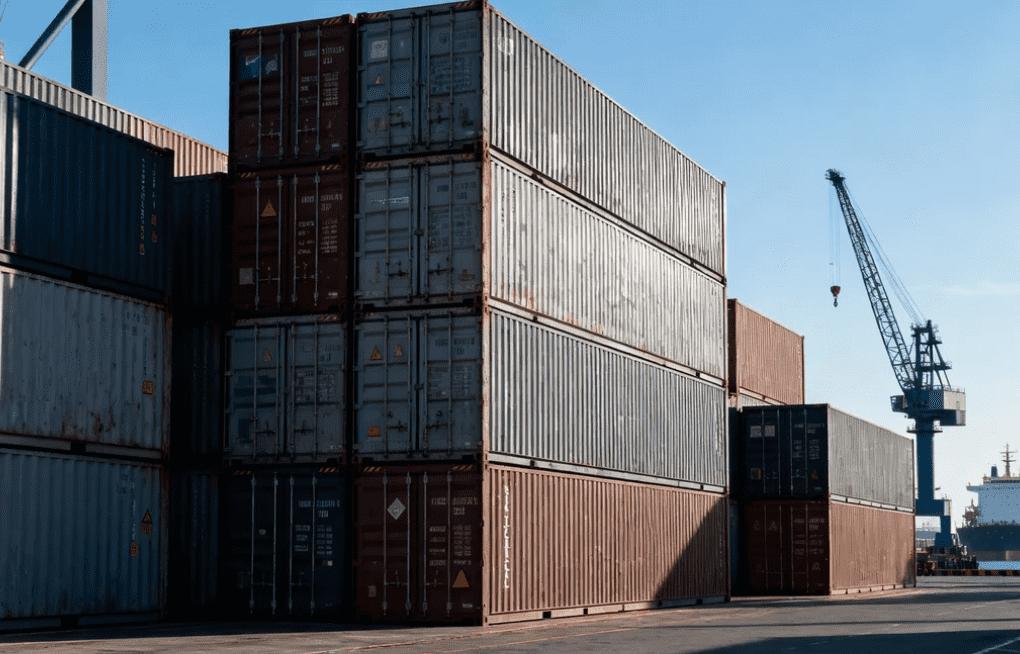Are you considering shipping from China to the United Arab Emirates but unsure where to start?
The role of a shipping agent is crucial in navigating the complexities of international trade. In this comprehensive guide, we will delve into the importance of utilizing a shipping agent, outline the key steps in the shipping process, and provide insights into selecting the best shipping partner. From understanding cost considerations to tracking your shipment, this article aims to equip you with the knowledge needed for a seamless shipping experience.

Overview of Shipping Agents from China to the United Arab Emirates
The role of a shipping agent is crucial in facilitating international trade, particularly when importing goods from China to the United Arab Emirates (UAE). Shipping agents act as intermediaries between importers and carriers, ensuring that goods are transported efficiently, legally, and cost-effectively. Utilizing a reliable shipping agent can significantly streamline the logistics process, reducing delays and minimizing the risk of errors. They provide expert advice on regulatory compliance, documentation, and the best shipping practices, making them an invaluable partner in international trade.
Importance of Utilizing a Shipping Agent for International Trade
In the intricate world of global commerce, navigating the complexities of shipping regulations, customs procedures, and logistical arrangements can be overwhelming. For businesses looking to import goods from China to the UAE, a proficient shipping agent offers several advantages:
- Expertise: Shipping agents possess in-depth knowledge of international shipping laws and regulations, ensuring compliance with both Chinese and UAE regulations.
- Cost Efficiency: They can negotiate better shipping rates due to their relationships with carriers, often leading to significant savings.
- Time-Saving: Their experience allows for faster resolution of issues that may arise during the shipping process, minimizing delays.
- Comprehensive Services: Many agents, like Dantful International Logistics, offer a wide range of services, including ocean freight, air freight, customs clearance, and warehouse services, all under one roof.
Understanding the Shipping Process from China to the UAE
Navigating the shipping process from China to the UAE involves several critical steps. A clear understanding of these steps can ensure a smoother importation experience.
Key Steps in the Shipping Process
- Market Research: Before initiating the shipping process, conduct thorough market research to understand the demand for your imported goods in the UAE.
- Selecting a Shipping Method: Determine whether sea freight or air freight is more suitable for your shipment based on cost, urgency, and the nature of the goods.
- Engaging a Shipping Agent: Choose a reputable shipping agent like Dantful International Logistics to handle the logistics, documentation, and customs clearance processes.
- Preparing Shipment Documents: Ensure all necessary documentation is prepared, including commercial invoices, packing lists, and certificates of origin.
- Customs Clearance: Work with your shipping agent to ensure compliance with UAE customs regulations, including the payment of any applicable duties and taxes.
- Tracking Your Shipment: Utilize tracking technologies provided by your shipping agent to monitor the status of your shipment in real-time.
Transportation Modes: Sea Freight vs. Air Freight
When choosing a transportation mode for shipping goods from China to the UAE, it is essential to weigh the pros and cons of sea freight and air freight.
| Criteria | Sea Freight | Air Freight |
|---|---|---|
| Cost | Generally cheaper for large shipments | More expensive, especially for small shipments |
| Speed | Slower, typically takes 20-30 days | Faster, usually 3-7 days |
| Capacity | High capacity, suitable for bulk goods | Limited capacity, ideal for urgent or lightweight items |
| Environmental Impact | Generally lower carbon footprint | Higher carbon emissions |
| Tracking | Limited tracking options | Advanced tracking capabilities |
Ultimately, the choice between sea freight and air freight will depend on the specific needs of your business, including budget, timeline, and the nature of the goods being imported. Working with a knowledgeable shipping agent can help you make the best decision for your import needs.
Choosing the Best Shipping Agent for China-UAE Trade
Essential Qualities of a Reliable Shipping Agent
When selecting a shipping agent for transporting goods from China to the United Arab Emirates (UAE), it’s imperative to consider a variety of attributes that define a reliable partner. Here are some essential qualities to look for:
Experience and Expertise: An ideal shipping agent should have extensive experience in international logistics, particularly in the shipping from China to UAE trade lane. This means they are familiar with the nuances of shipping regulations, customs clearance processes, and the local market conditions.
Comprehensive Service Offerings: A reliable shipping agent should provide a wide range of services, such as ocean freight, air freight, customs clearance, and door-to-door delivery. Dantful International Logistics offers a one-stop solution that encompasses all these services, ensuring a seamless shipping experience.
Strong Network Connections: Effective shipping agents have established relationships with key stakeholders in the logistics supply chain, including shipping lines, airlines, customs authorities, and warehousing facilities. This network can facilitate smoother operations and potentially better rates.
Transparent Pricing: The shipping agent should provide clear and transparent pricing structures without hidden fees. Understanding the cost breakdown is crucial for effective budgeting and planning.
Technology Utilization: A good shipping agent should leverage technology for tracking shipments and managing logistics efficiently. This ensures that you have real-time updates on your cargo’s status.
Strong Communication Skills: Since international shipping involves multiple parties and time zones, effective communication is key. Your shipping partner should be responsive, providing timely updates and support throughout the shipping process.
Questions to Ask When Selecting a Shipping Partner
To ensure that you choose the best shipping agent for your needs, consider asking the following questions during your selection process:
What services do you provide?: Understanding the full range of services offered will allow you to assess if they align with your shipping needs.
Can you provide references?: A reputable agent should be willing to share testimonials or references from previous clients, which can provide insight into their reliability and service quality.
What are your pricing structures?: Request a detailed breakdown of costs associated with shipping to the UAE, including any additional fees that may apply.
How do you handle customs clearance?: Knowing their approach to customs can give you an idea of how efficiently they can manage your shipments when they arrive in the UAE.
What tracking options do you provide?: Inquire about the technology they use for shipment tracking and how frequently updates are provided.
How do you manage delays or issues?: Understanding their process for addressing unforeseen circumstances can help gauge their problem-solving capabilities.
Shipping From China to Middle East Countries:
- Shipping from China to Saudi Arabia
- Shipping from China to UAE
- Shipping from china to KUWAIT
- Shipping From China To EGYPT
- Shipping from China to Bahrain
- Shipping From China To Jordan
- Shipping From China To Israel
- Shipping from China to Qatar
- Shipping From China To IRAQ
- Shipping from China to Iran
Cost Considerations for Shipping from China to the UAE
Breakdown of Shipping Costs: What to Expect
When shipping goods from China to the UAE, it’s vital to understand the various components that contribute to the overall shipping costs. Below is a breakdown of potential charges you can expect:
| Cost Component | Description |
|---|---|
| Freight Charges | Costs associated with transporting goods by sea or air. |
| Customs Duties and Taxes | Fees imposed by the UAE government on imported goods. |
| Insurance Costs | Optional insurance for protecting your cargo against loss or damage. |
| Handling Fees | Charges for loading and unloading your goods at the port or airport. |
| Documentation Fees | Costs related to processing shipping documents, such as bills of lading. |
| Delivery Charges | Fees for transporting goods from the port to the final destination. |
How to Get Accurate Shipping Quotes
To obtain accurate shipping quotes, consider the following steps:
Provide Detailed Information: When requesting quotes, be as detailed as possible about the goods you are shipping. Include dimensions, weight, value, and the origin and destination points.
Request Quotes from Multiple Agents: Comparing quotes from various shipping agents will give you a clearer picture of the market rates and help you identify the best value.
Ask About Additional Fees: Ensure that the shipping agent discloses all potential additional fees upfront. This includes handling charges, customs duties, and any other costs that may arise.
Check for Seasonal Variability: Shipping costs can fluctuate based on demand, particularly during peak seasons. Being aware of these factors can help you make informed decisions.
Consider Long-Term Partnerships: If you plan to ship regularly, negotiating contracts with shipping agents could lead to better rates and services in the long run.
By following these guidelines, you can make informed decisions and select a shipping agent who offers professional, cost-effective, and high-quality services tailored to your needs. Dantful International Logistics is well-equipped to provide comprehensive shipping solutions for your trade from China to the UAE.
Documentation Required for Shipping to the UAE
Key Shipping Documents You Need
When shipping goods from China to the United Arab Emirates (UAE), it is crucial to ensure that you have all the necessary documentation in place. This not only facilitates a smooth shipping process but also helps you avoid potential delays and additional costs at customs. Here are the key shipping documents you need:
Commercial Invoice: This document provides details about the transaction, including the seller’s and buyer’s information, item descriptions, quantities, prices, and payment terms. It serves as proof of sale and is required for customs clearance.
Packing List: A packing list outlines the contents of each package, including weights and dimensions. It is used by customs officials to verify the shipment.
Bill of Lading (B/L): This legal document is issued by the shipping company and serves as a receipt for the cargo. It outlines the terms of transport and acts as a title of ownership.
Certificate of Origin: This document certifies where the goods were manufactured or produced, which may impact tariff rates and customs duties.
Import Permit: Depending on the nature of the goods being imported, you may require specific permits or licenses from UAE authorities.
Insurance Certificate: This document provides evidence of insurance coverage for the goods during transit, safeguarding against potential loss or damage.
Importance of Compliance with UAE Import Regulations
Compliance with UAE import regulations is vital for ensuring that your shipment clears customs efficiently and without any legal hurdles. The UAE has strict import laws, including regulations on prohibited items, import duties, and labeling requirements. Failing to adhere to these regulations can result in delays, fines, or even confiscation of goods.
It is essential to stay updated with the latest regulations set forth by the UAE Federal Customs Authority and consult with your shipping agent for specific compliance requirements related to your products. Partnering with a reliable shipping agent like Dantful International Logistics can help ensure that your documentation is accurate and compliant, mitigating the risk of complications during the import process.
Tracking Your Shipment from China to the UAE
Available Technologies for Shipment Tracking
In today’s fast-paced global trade environment, tracking your shipment from China to the UAE has become easier and more accessible thanks to advanced technologies. A few common tracking technologies include:
GPS Tracking: Many shipping companies provide real-time GPS tracking, allowing shippers to monitor the live location of their cargo.
IoT Devices: Internet of Things (IoT) devices can be integrated into shipping containers to provide real-time data on location, temperature, humidity, and other environmental factors.
Mobile Apps: Shipping agents often offer mobile applications that provide users with updates on shipment status, estimated delivery times, and alerts for any potential issues.
Web Portals: Many logistics companies maintain dedicated web portals where clients can log in to view shipment details, documentation, and historical data.
The Benefits of Real-Time Tracking for Importers
Real-time tracking offers several advantages for importers shipping from China to the UAE:
Enhanced Visibility: Importers can monitor their shipments at any time, providing peace of mind and transparency throughout the shipping process.
Proactive Issue Resolution: With real-time data, importers can quickly identify and address any delays or complications, reducing the risk of financial losses.
Improved Planning and Inventory Management: Accurate tracking information allows businesses to better plan their inventory and manage supply chain operations effectively.
Customer Satisfaction: Providing customers with accurate tracking information enhances their experience and builds trust in your services.
Finalizing Your Shipping Agreement with a Chinese Agent
Key Contract Terms to Negotiate
When finalizing your shipping agreement with a Chinese agent, it is essential to negotiate key contract terms to ensure clarity and mutual understanding. Some of the critical terms to discuss include:
Shipping Rates: Clearly outline the costs associated with various transportation modes (e.g., ocean freight vs. air freight), as well as any additional fees (e.g., customs clearance).
Transit Times: Define expected transit times for different shipping methods and any potential delays.
Liability and Insurance: Discuss the liability of each party concerning loss or damage during transit and ensure that appropriate insurance coverage is in place.
Payment Terms: Determine the payment schedule and methods, including any deposits required prior to shipment.
Dispute Resolution: Establish procedures for resolving disputes, including jurisdiction and arbitration options.
Building a Long-Term Relationship with Your Shipping Agent
Developing a long-term relationship with your shipping agent can lead to more favorable terms, enhanced communication, and improved service quality. Here are some tips for fostering a successful partnership:
Open Communication: Maintain regular communication with your shipping agent to address any concerns and provide feedback.
Transparency: Share your business goals and shipping needs to help your agent better understand your requirements.
Loyalty: Demonstrating loyalty by choosing a single partner for your shipping needs can lead to better service and negotiated rates.
Regular Reviews: Periodically review the agreement and service levels to ensure that your shipping agent continues to meet your expectations.
By choosing Dantful International Logistics, a highly professional, cost-effective, and high-quality one-stop international logistics service provider, you can ensure that your shipping needs from China to the UAE are met efficiently and effectively.

Young Chiu is a seasoned logistics expert with over 15 years of experience in international freight forwarding and supply chain management. As CEO of Dantful International Logistics, Young is dedicated to providing valuable insights and practical advice to businesses navigating the complexities of global shipping.





















